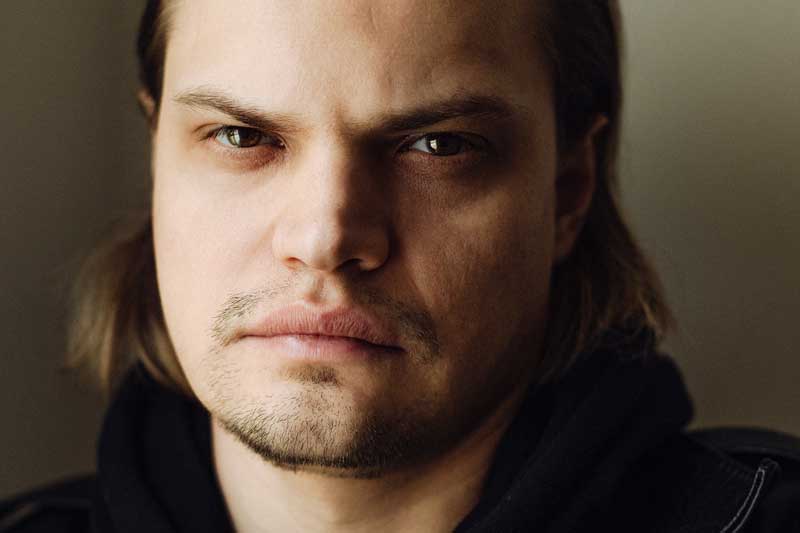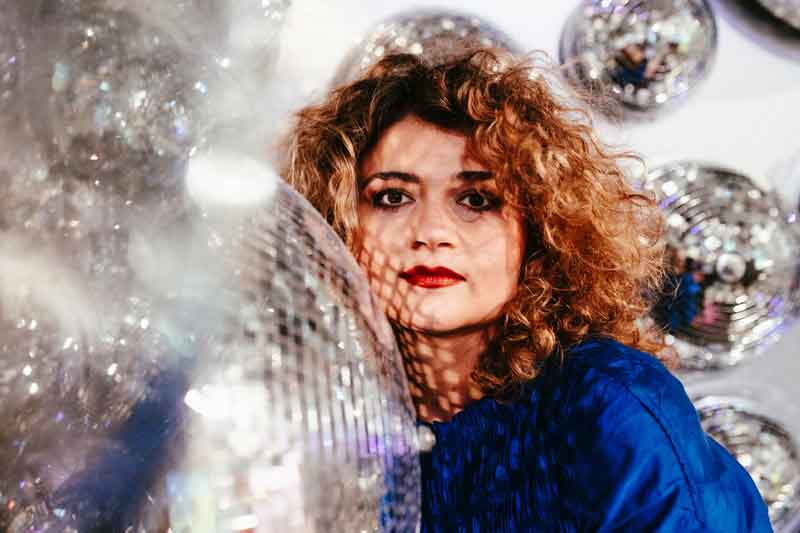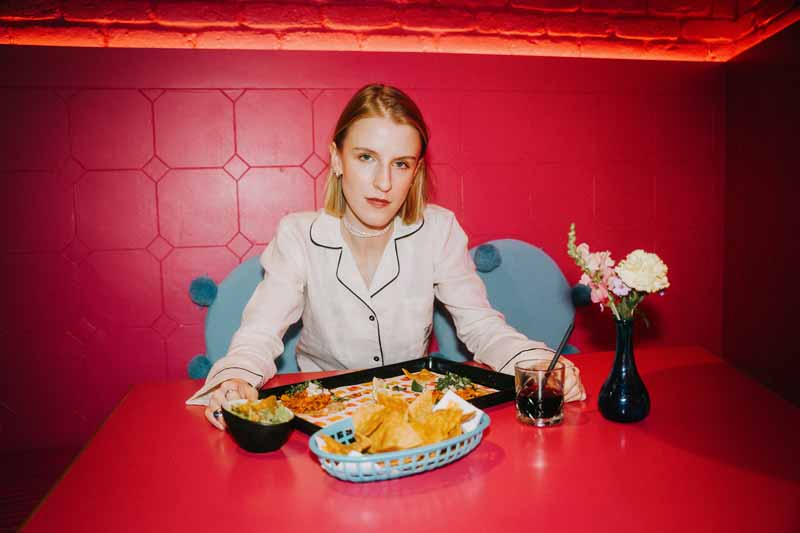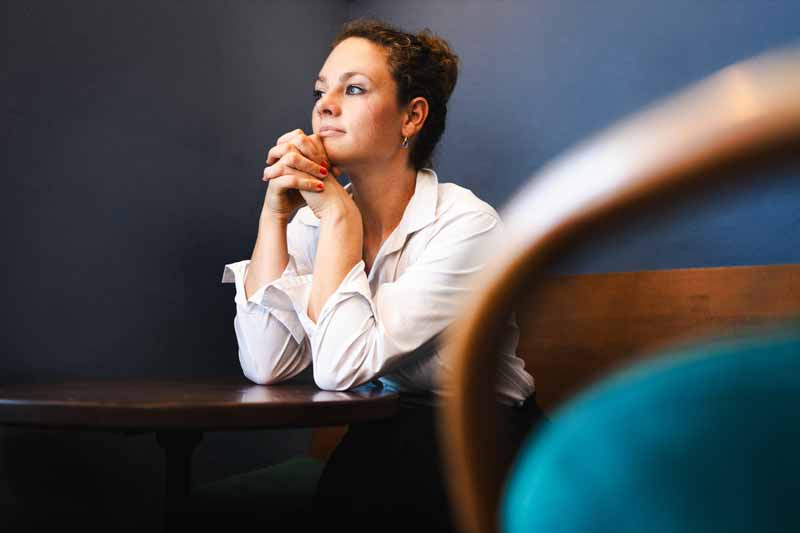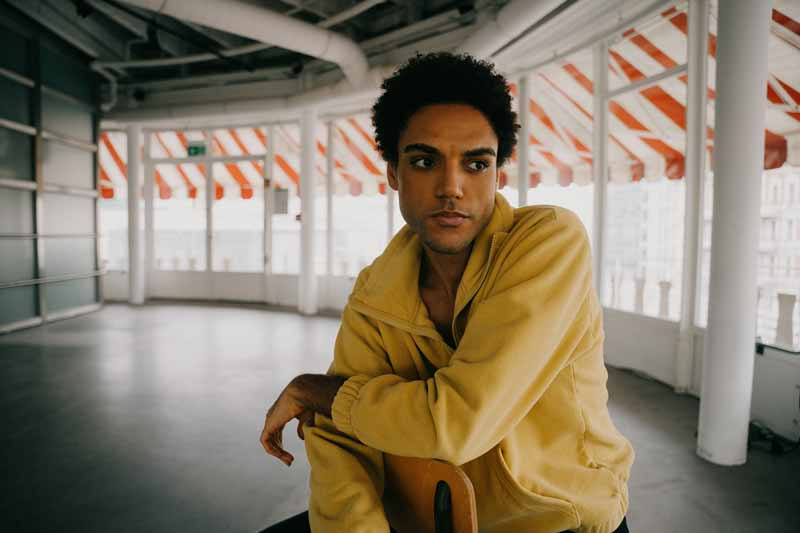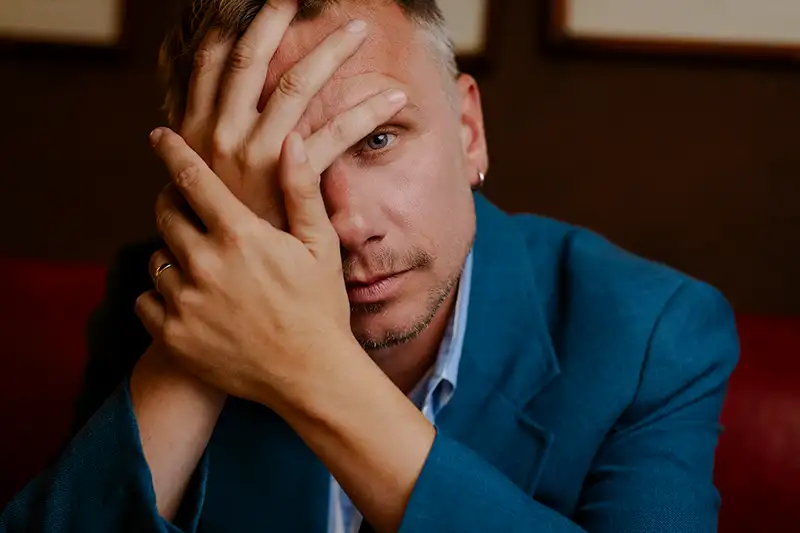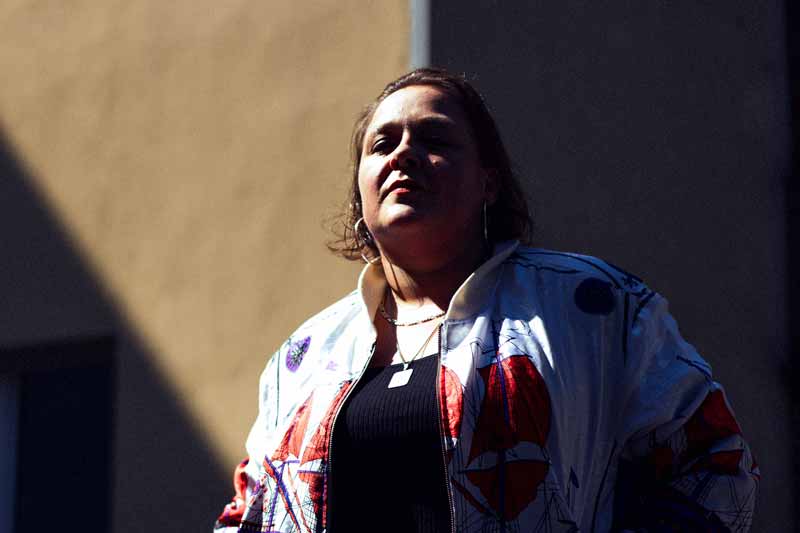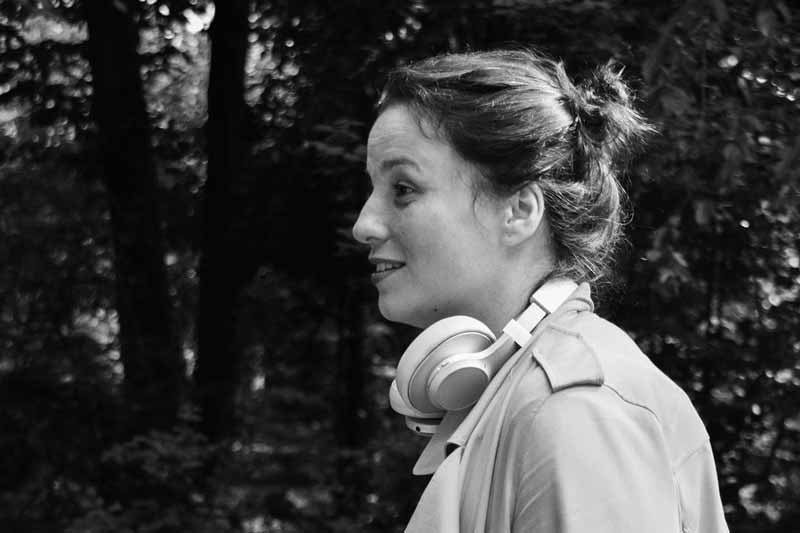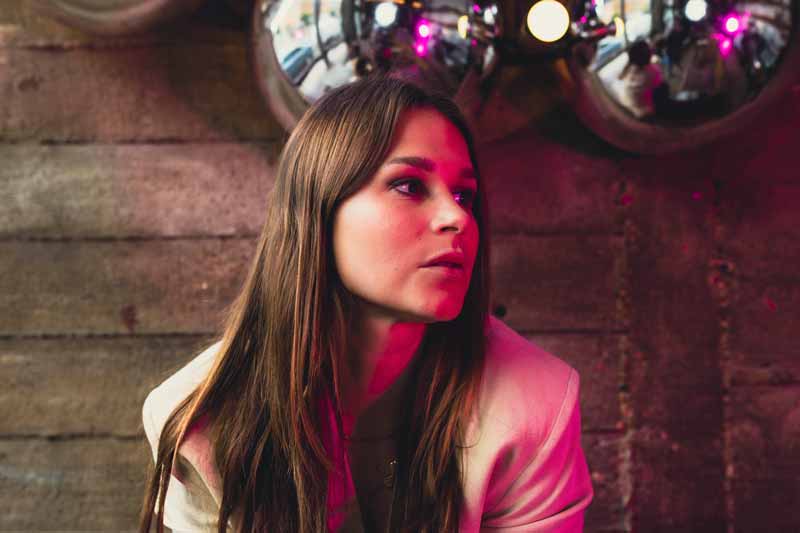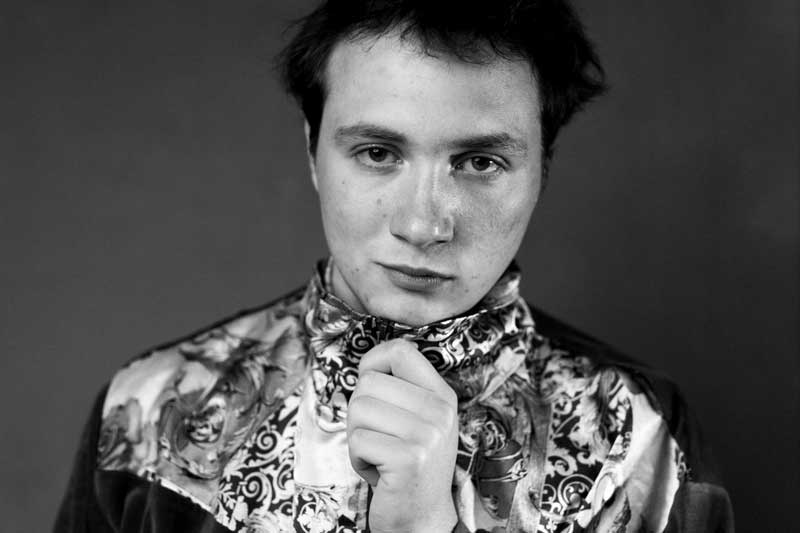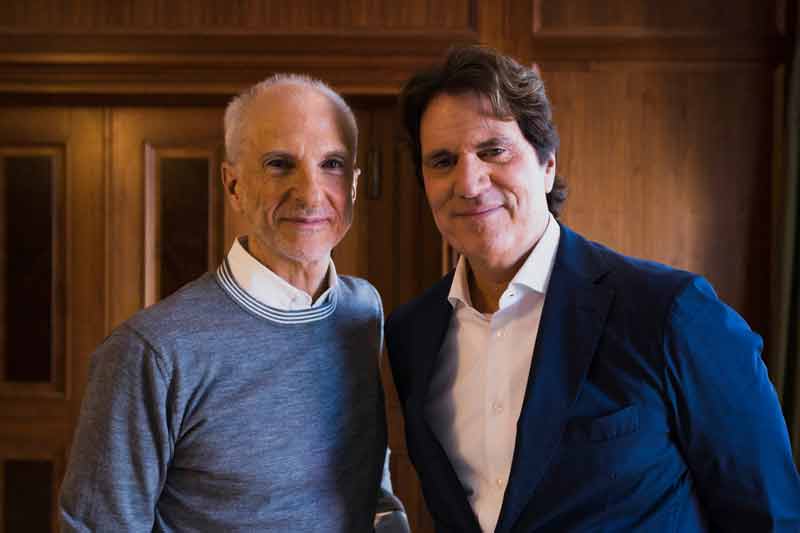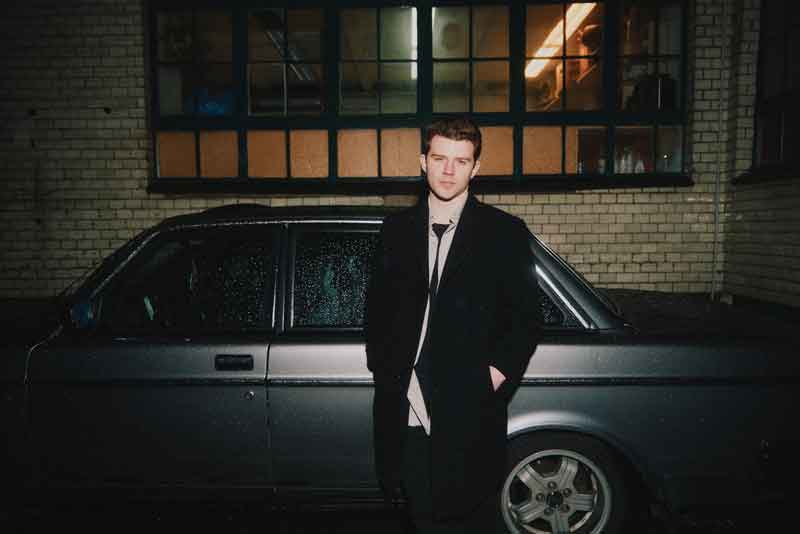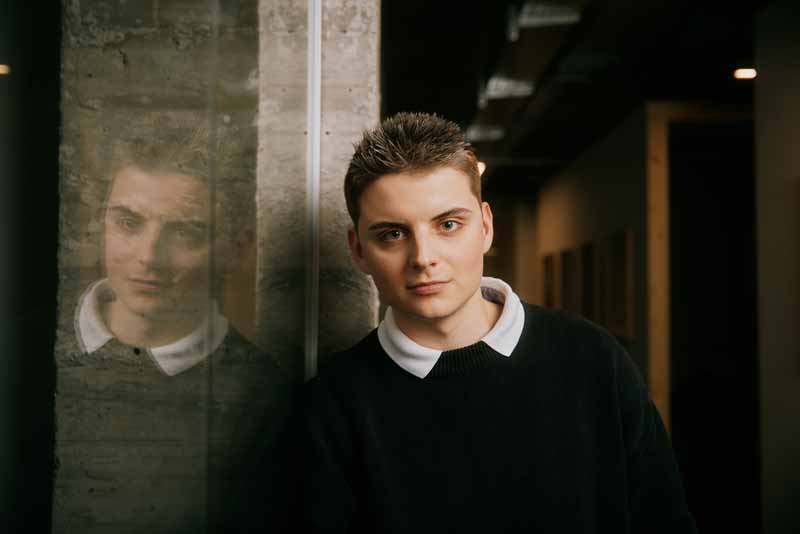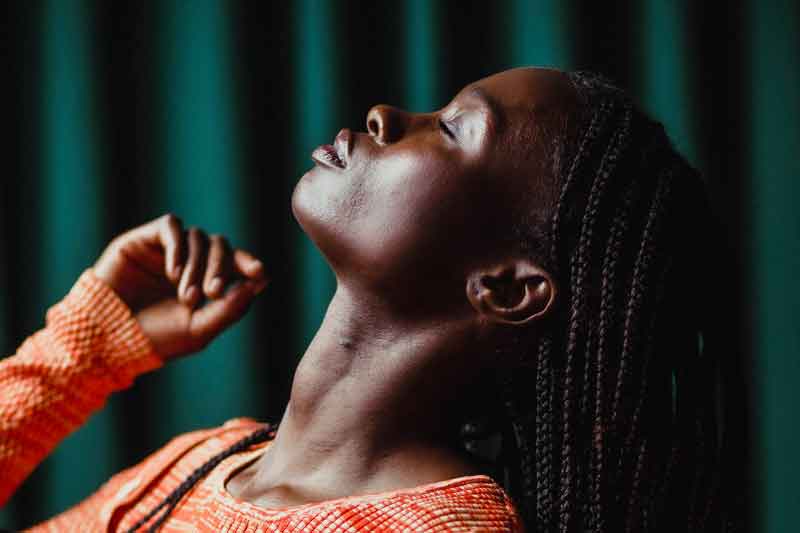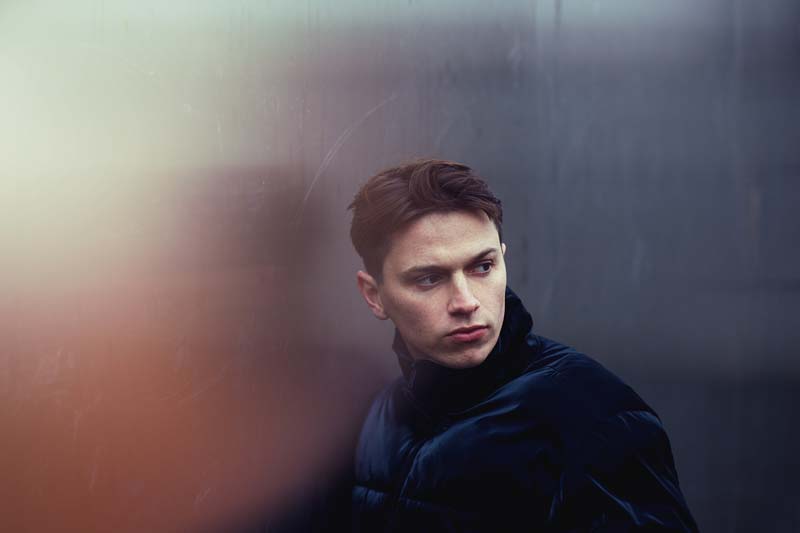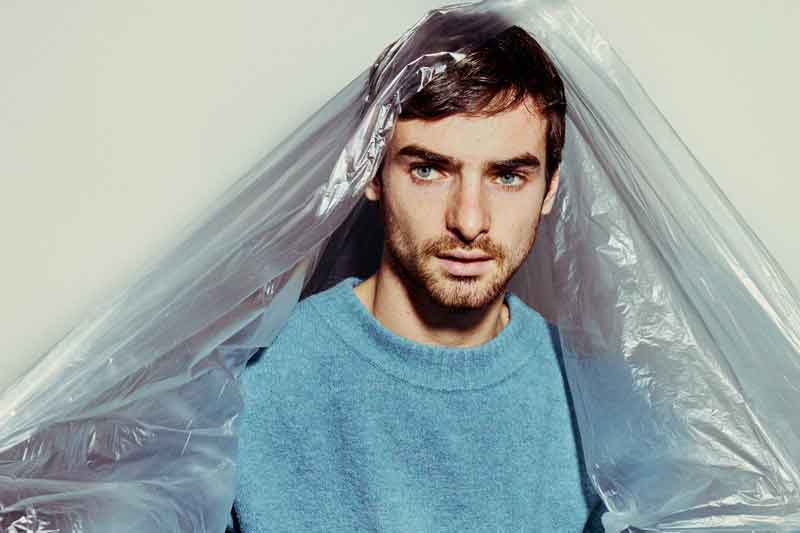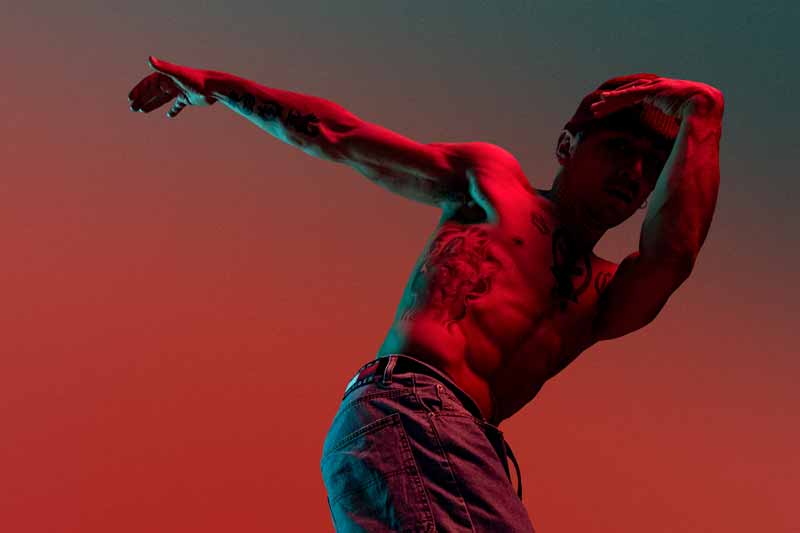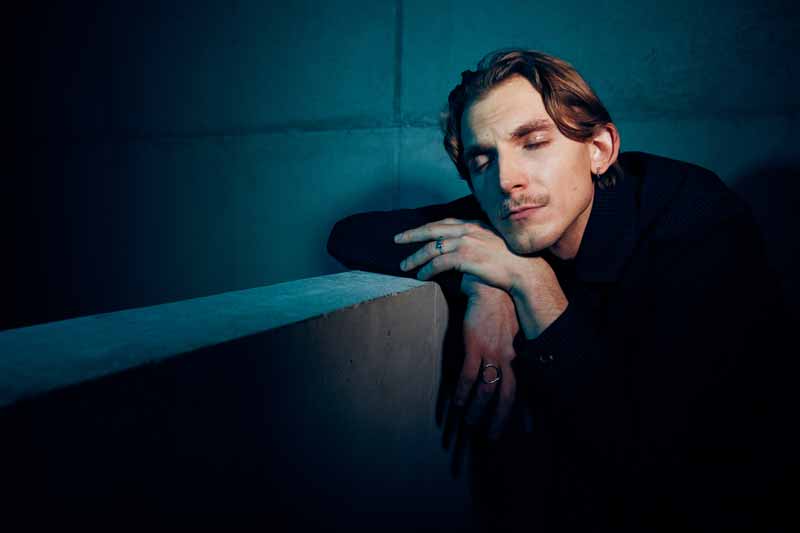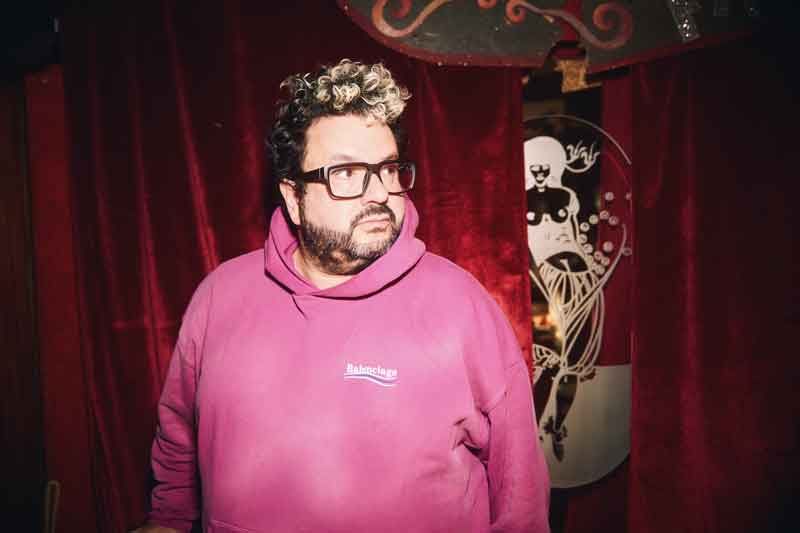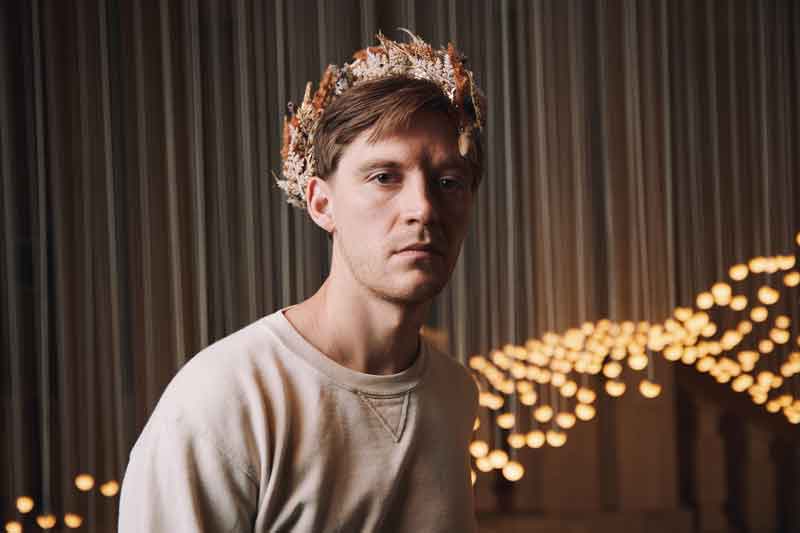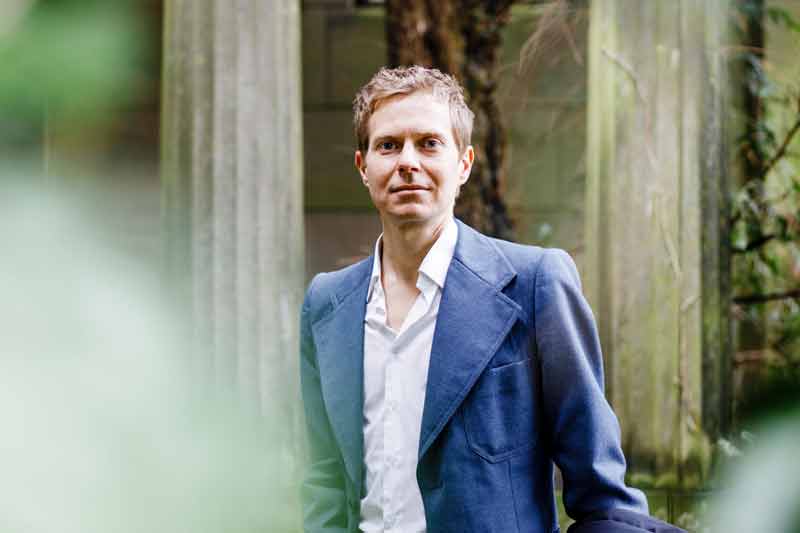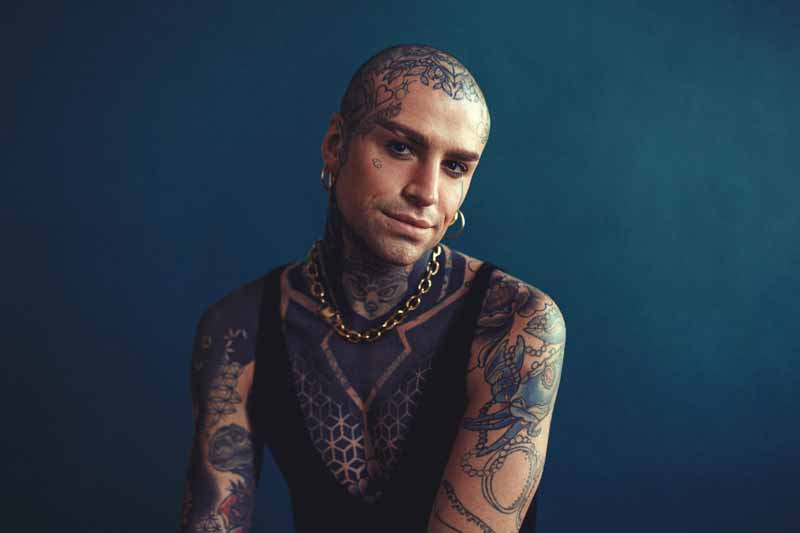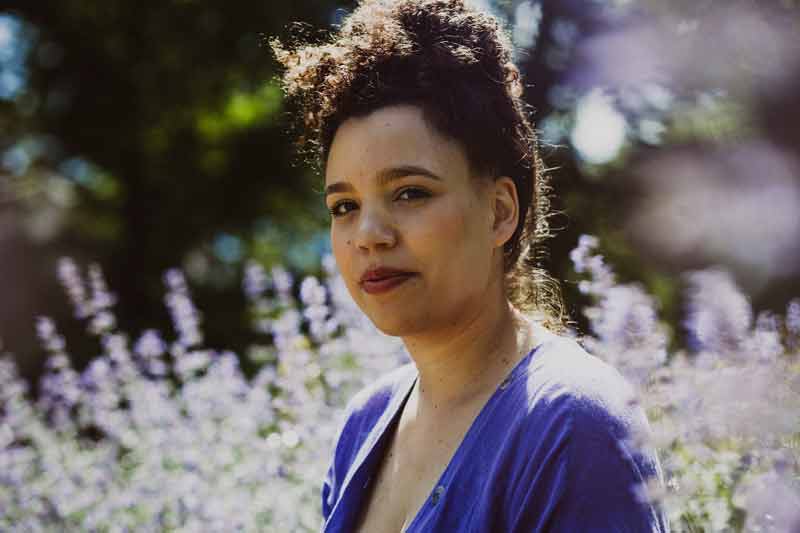Interview — Daniel–Ryan Spaulding
»I don’t think that comedy is a safe space«
With a sharp sense of humor, comedian Daniel-Ryan Spaulding likes to confront not only German quirks, but also attitudes—especially those of Berliners. The 36-year-old conveys this with his very own attitude as a gay man born and raised in Canada—and who fled to Europe for the lack of culture, as he says. What follows is an interview about German smugness, Canadian boredom, and European failure in terms of gay rights.
15. September 2021 — Interview & text: Jonas Meyer, Photography: Maximilian König
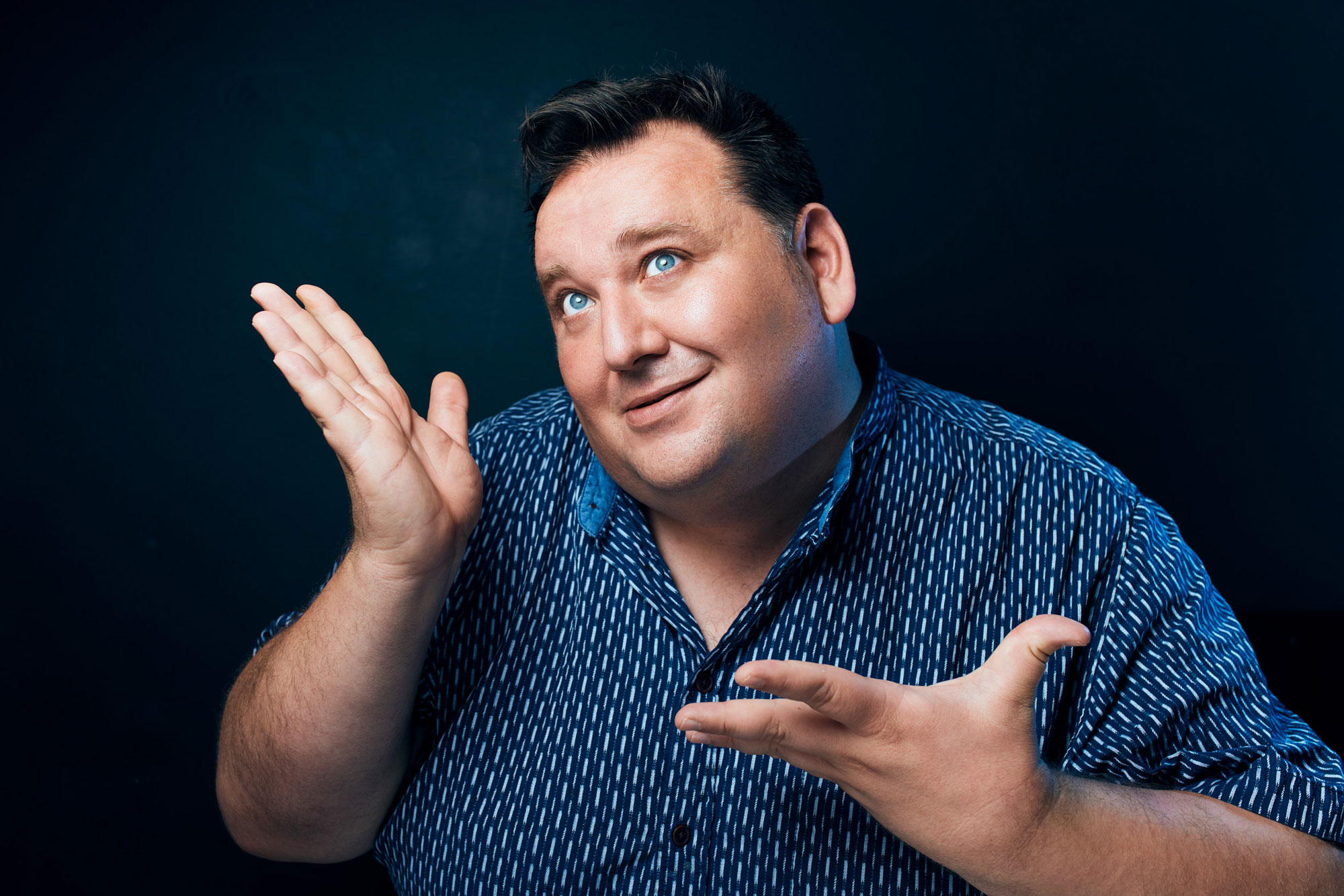
“The earliest representations I saw on screen of gay people were always people to be mocked,” says CNN’s world-famous anchor Anderson Cooper on Visible: Out on Television, a five-part docuseries on Apple TV+. The miniseries looks at the visibility of queer people on television over the last 70 years, starting with Episode 1, “The Dark Ages.”
Cooper, who was born in 1967 in New York City, came out as gay in 2012. That made him, according to The New York Times, “the most prominent openly gay journalist on American television” at the time. With this background, he has not only witnessed a lengthy process towards more representation of queer people in the media, but also played an important role in it, like many other individuals who have fought and continue to fight for more diversity, acceptance, and equality on screen.
But the fact that Apple created an exciting retrospective of the past seven decades with its series does not mean that everything is good today. In many countries around the world, the portrayal of queer people and topics in film and television is still banned. And even in a country like Germany, a lot still needs to be improved when it comes to more queer visibility on screen. And while we’re at it: A little more humor couldn’t hurt either.
What a blessing that there is Daniel-Ryan Spaulding, because he is an expert on both. The 36-year-old comedian—who was born and raised in Canada and lives in Berlin now—became famous in 2014 with a video he posted on YouTube, titled “If Gay Guys Said the Stuff Straight People Say…” Even though now it seems we’ve seen videos like it a hundred times, seven years ago it was more or less the first of its kind, and has hit more than 2 million views to date.
But Daniel’s comedy isn’t just about gay stereotypes and dull prejudices. With his web series It’s Berlin!, he makes fun of the very special attitude of many super-cool residents of the German capital, and with “Hilda und Helga,” he created an oddball lesbian couple that helps bring weird German quirks before our eyes. Besides that, he’s just started a new podcast that sheds light on the 1920s and 2020s.
So, it’s high time for an interview. We meet Daniel at the Bar Saint Jean—a cozy, stylish, and warmhearted place that is an integral part of the bar landscape in Berlin, not only for the gay scene, and that has become a kind of home for many individuals, especially of the queer community.
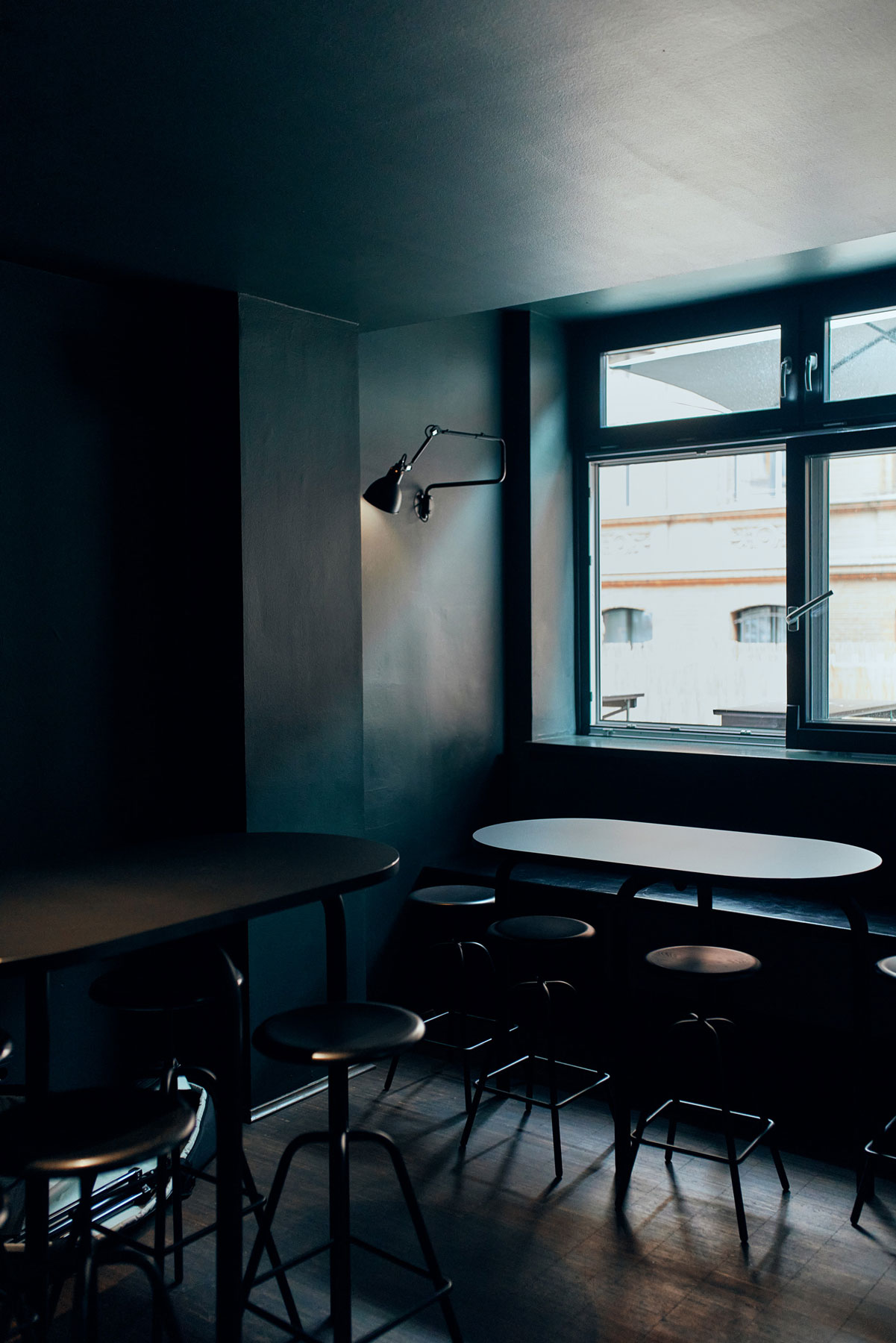
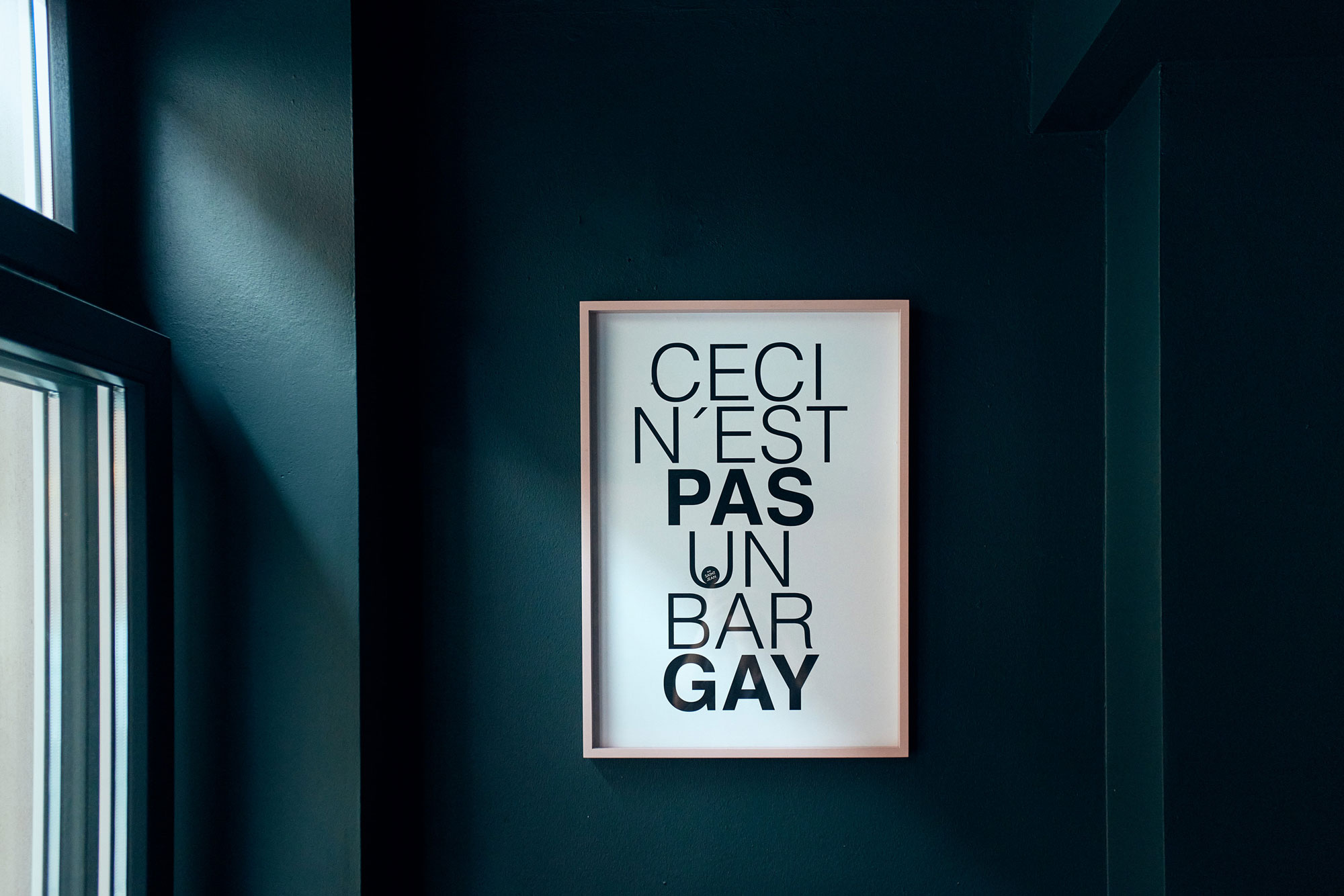
»People don’t have an attention span anymore.«
MYP Magazine:
A couple of weeks ago you released the very first episode of your new podcast, The Roaring 20s! On that show you not only reflect on the decade we’re living in—with all its societal, political and cultural developments—but you also look back at the 1920s. What is it exactly that fascinates you so much about these two eras?
Daniel (laughs):
I think the 1920s were an interesting time, especially in Germany. It was between the two World Wars and a lot was in motion. Artistic culture was unfolding, cinema evolved rapidly, and there was also a big gay rights movement that happened at that time. In my opinion the past is always relevant to how we’re living our lives now, how society has evolved, and how things change and grow. It seems that things are kind of cyclical, just with different patterns, trends and needs—not necessarily politically, but in terms of fashion, art, and culture. That’s one of the reasons why I thought that would be an interesting element to my podcast because we don’t really care that much about history anymore; everything is so instant, and people don’t have an attention span anymore.
MYP Magazine:
It seems that, on the podcast, you open up a much more serious part of you, talking about homophobia and the systematic suppression of gay people in Hungary, for example. Do you feel that your weapon of humor isn’t powerful enough to fight for a more open and tolerant society?
Daniel:
No, I think we can all only do what we really can do. I myself am playing my part which means that I’m trying to build a better world and live a good life. I just want to bring some happiness to the world. I’m not a paramedic, a doctor, or a teacher, but I think that what I do is still helpful, and when I talk about these issues in my work, I just make them a little easier to swallow with a bit of humor.
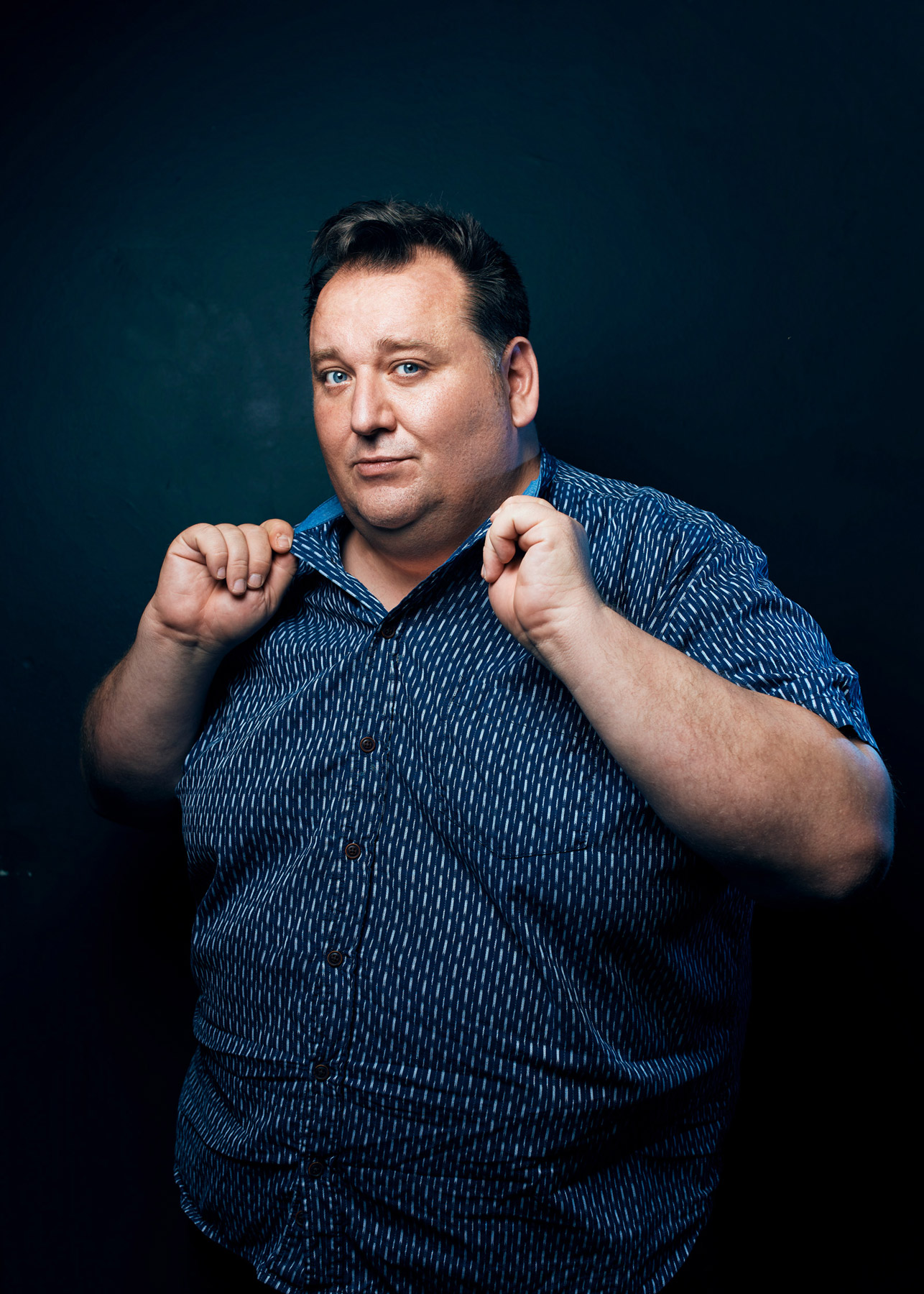
»When I get married to a man in Denmark and I move to Poland, am I suddenly not married to him anymore?«
MYP Magazine:
How do you as an expat assess the current socio-political situation for queer people in Europe, especially with regard to gay rights? Would you say that, especially in Eastern Europe, there’s a catastrophe brewing that most people don’t notice?
Daniel:
First of all, I don’t think of myself as an expat. That’s a really outdated term. I would say I’m an immigrant, but I’m European as well. I just belong here, you know! Everyone belongs where they are, that’s what I think.
Anyway, I don’t understand why there aren’t any minimum requirements of human rights to be in the European Union. That doesn’t make sense to me. It’s weird that marriage equality is in some countries and not in others. When I get married to a man in Denmark and I move to Poland, am I suddenly not married to him anymore? Do we suddenly not have the same rights that we’d normally have? It’s very bizarre to me. I think that there are definitely inconsistencies in terms of the idea of Europe and the actual practicality of it. And if we’re talking specifically about gay rights: One of the things that right-wing and sort of fascist governments do right off the bat is to take issues that aren’t really issues—like gay rights or trans rights—and use them to divide people.
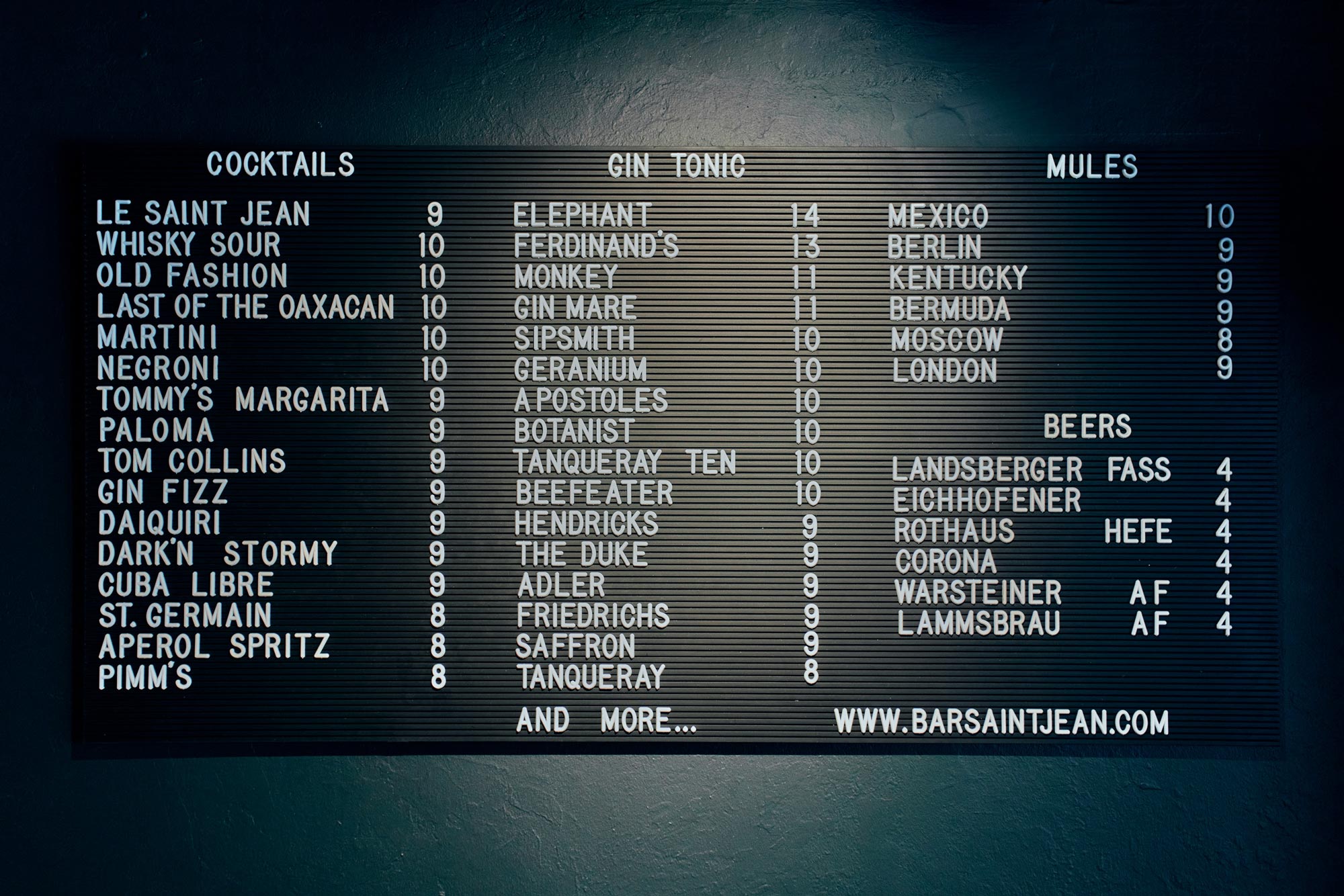
»I definitely had more homophobia and bad experiences with certain people in my family than with my community.«
MYP Magazine:
In the third episode of your podcast, you’re talking about your high school years, being educated in an environment that was completely heteronormative. What kind of place was the Vancouver of the 1990s?
Daniel:
Well, my community was very liberal, it was sort of a suburban working-class community. I went to really good public schools, had very great teachers, and the level of education was really high. And talking about the society in general, I would say that Canadians are characterized by a high degree of politeness and manners, they are very soft and sensitive. It’s really drilled into you to always say, “I beg your pardon,” “Thank you,” or “I apologize” instead of “What?!”. I remember that anti-bullying was a huge thing growing up in the 90s, especially in elementary school, at least in my community. My teacher for first and second grade was the foremost expert on bullying in the whole country. So, I guess my community protected me from some potential homophobia or bullying that I might have gotten as a child. I definitely had more homophobia and bad experiences with certain people in my family than with my community.
But to be honest, my personal story isn’t necessarily representative for the rest of Canada. There are lots of places in that country where my experience wouldn’t have been the same—where it still wouldn’t be the same.
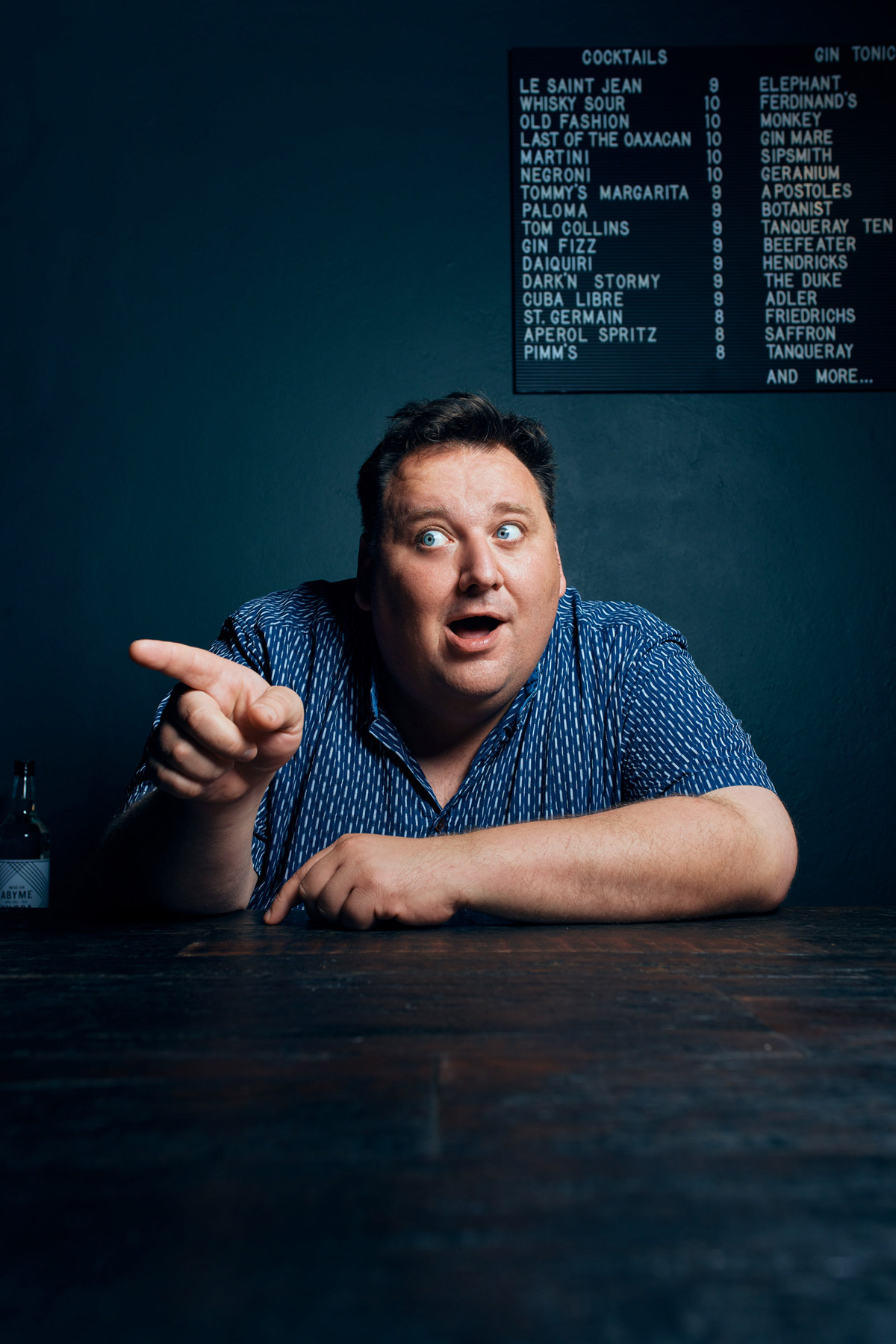
»I was never a kid who was like the goofy class clown.«
MYP Magazine:
What came first in your life? The awareness of being gay or being funny?
Daniel:
I don’t know. I think those are things that I always knew and always was on some level. I do distinctly remember a moment when I realized that I was gay or thought about sexuality for the first time. I was probably three and I was playing with Barbies (laughs loudly).
And in terms of being funny, I was never a kid who was like the goofy class clown. My humor is a little more reflective. I remember that when I was seven, I was writing a story and the teacher just loved it so much. She made me read it to one of the other teachers and recorded me on video because she thought it was so funny and creative. I guess I was always a good storyteller with a talent for processing interesting ways of seeing the world, even when I was a little boy.
MYP Magazine:
Was there a specific point in time when you decided to be a comedian?
Daniel:
No. I always knew that I wanted to be a performer. From the time I was a child, that was the only thing I really ever wanted to do in my life.
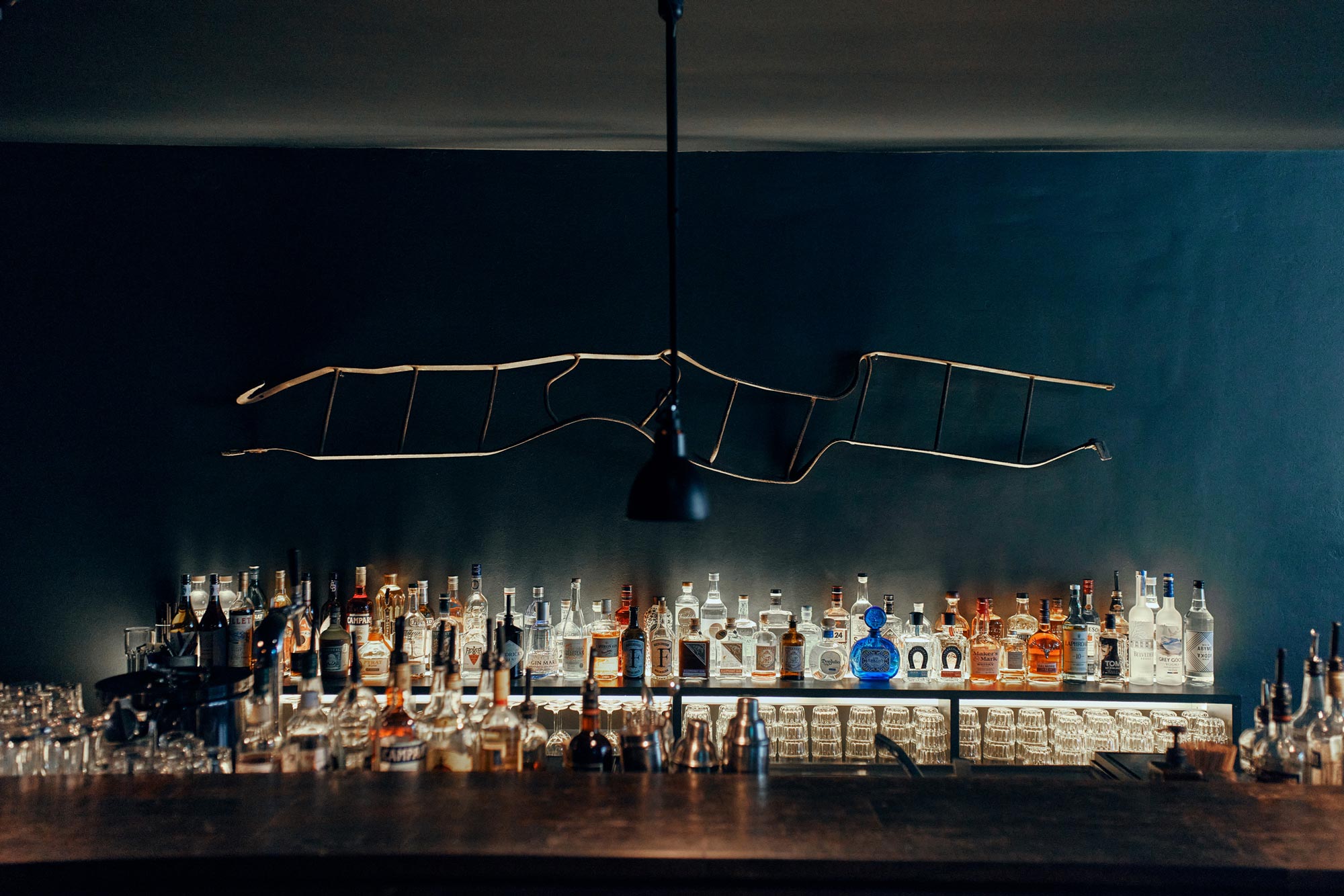
»I left Canada because I don’t like the lack of culture.«
MYP Magazine:
Do you remember the first time ever you were standing on a stage, performing in front of an audience?
Daniel:
If you’re talking about ever, it would be like in children’s plays at school, but then I obviously did theater in high school, and a couple of years later I majored in theater at the university; but when I first started doing stand-up comedy, I was about 23 and performed at a gay bar in Vancouver. It was a sleezy, colorful, glittery place called Numbers, and they’d let me do my show there. I had like a one-hour slot before they started their karaoke night (laughs).
MYP Magazine:
Why did you leave Canada at some point?
Daniel:
I left the country because I don’t like the lack of culture. I think that in Europe—because there are so many different countries that are so densely populated—there’s such a long history and a really great appreciation for the arts and performances. I feel a lot more at home here. Besides that, I like to travel a lot, which can mean, for example, going to Portugal for a week or so, whereas in Canada, especially when you’re living in the Vancouver area, there’s really nothing to do except enjoying nature. And I don’t really enjoy nature. I don’t like camping, I don’t like kayaking, I don’t like hiking. I just like to hang out with beautiful men in bars and talk about life.
MYP Magazine:
But don’t you have a handsome prime minister in Canada?
Daniel:
Oh, I don’t like Justin Trudeau. He’s cute, but he’s very bad for the environment.
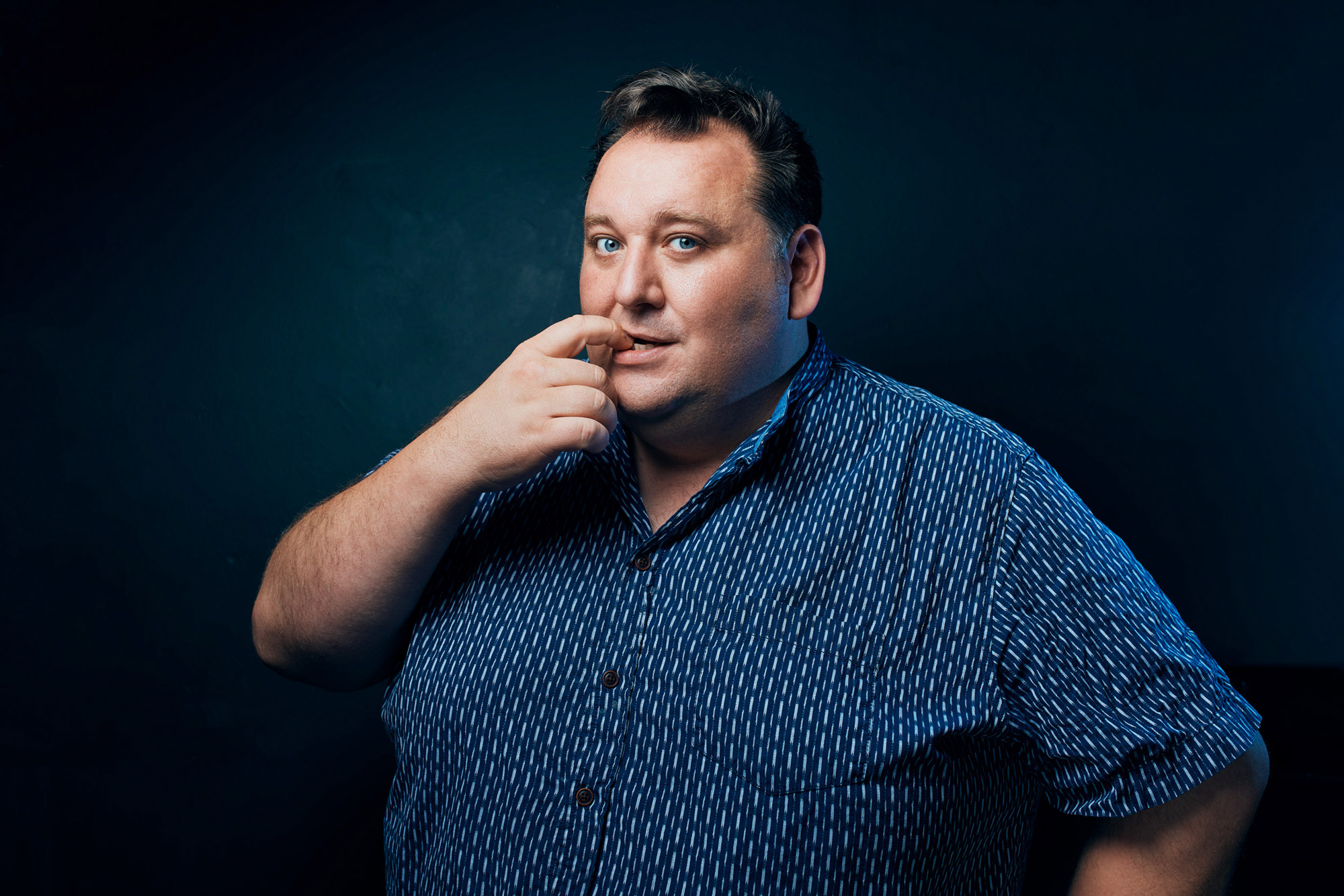
»In Berlin, it’s very hard to find a guy that wants to have a relationship with me.«
MYP Magazine:
Before you moved to Berlin, you lived in Amsterdam and Oslo. Is Berlin just another stopover in your life? Or could you imagine settling here?
Daniel:
No, I don’t really think that I could permanently settle in one place ever. I like to be open to where life and my career might take me. I also don’t think that I should stay in Berlin that much longer, at least on a full-time basis because it’s very hard to find a guy that wants to have a relationship with me. I guess I probably would get a boyfriend easier in other cities.
MYP Magazine:
Dating in Berlin is hard…
Daniel (laughs):
Well, does it even happen? Honestly, it’s definitely very difficult to date here. A lot of people come to Berlin because they don’t want to have a typical, normal life with a relationship. It’s a party city, people are wild.
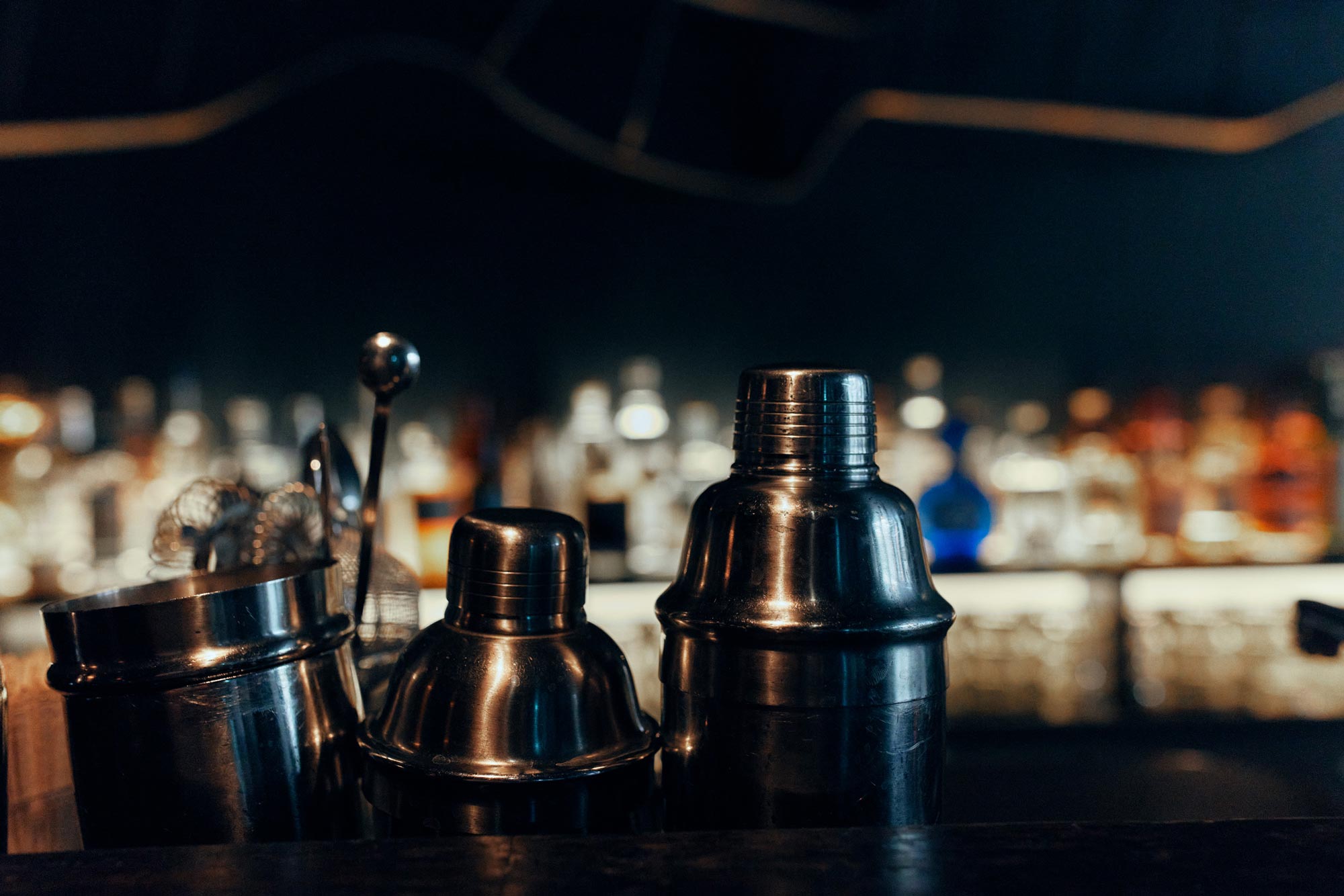
»I like creating content where you can get the idea of what I’m saying without it being spelled out to you.«
MYP Magazine:
In 2014 you released a video on YouTube, titled “If Gay Guys Said the Stuff Straight People Say…” By now, this video has hit more than 2 million views. What meaning does this 7-year-old clip have for your career?
Daniel:
I think it was a nice thing to have under my belt because it was a way of exposing microaggressions and straight privilege in a way that was very funny. I like creating content where you can kind of get the idea of what I’m saying without it being spelled out to you. And so, I’m very proud of that video. It sparked a lot of other clips of the same format. For example, BuzzFeed did “If Black People Said the Stuff White People Say” as well as every other possible version of it.
MYP Magazine:
What were the most remarkable reactions you got about the video?
Daniel:
I don’t know. I haven’t really had people writing me messages like, “You changed my life!” But I think a lot of people appreciated me doing this (smiles).
»I’m a very observant person.«
MYP Magazine:
On September 11, 2017 you published another video on YouTube, called “It’s Berlin.” This video was the prelude to a successful series in which you focus on the peculiarities of the German capital and its residents. To date, over 100 clips have been created in this way. How did the idea come about?
Daniel:
I actually started “It’s Berlin” when I was living in Amsterdam. I got the idea after I had visited Berlin, I just thought of this character and made a video out of it. People really liked it, and so I started to do a couple more. It felt like a good project and I thought I could turn it into a TV show one day, that’s why I eventually moved to Berlin.
MYP Magazine:
How do you develop the content? Do you just sit in a café and watch the Berliners?
Daniel:
It just happens organically, I guess. I’m a very observant person, I listen very well, and have a really good memory. So, when I have conversations, I always remember them, including all the details that people say. And if there’s something ridiculous or funny in it, I catalogue it into my head and use it some other day for a video. That’s it.
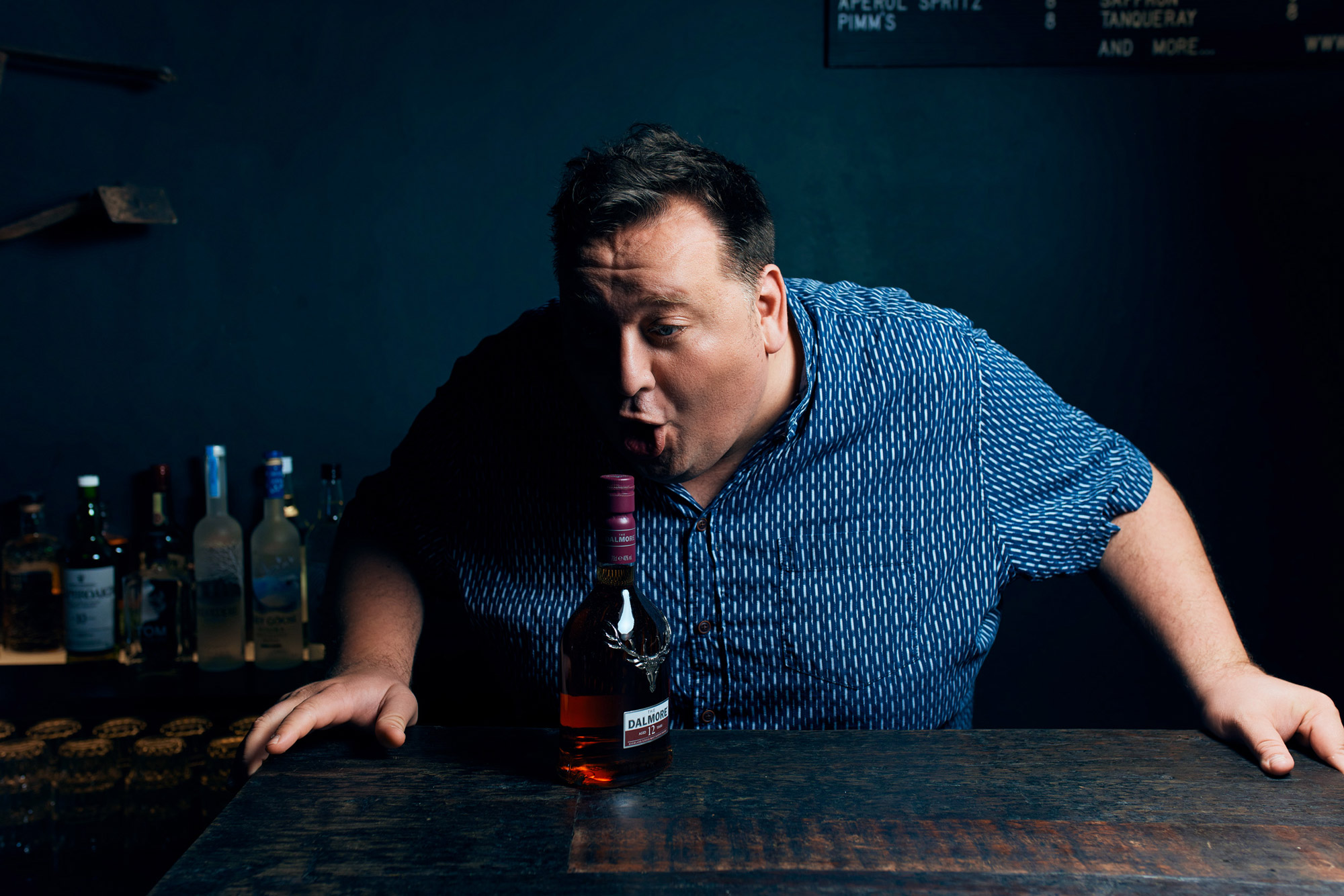
»I don’t like the German snitching culture at all.«
MYP Magazine:
By the way, I was wondering what bad thing might have happened to you here in Germany that you felt the need to create something like the characters Hilda and Helga, an old, grumpy, and xenophobic lesbian Stasi couple…
Daniel:
Well, I didn’t find them on the streets, they just grew in my imagination. I think these characters come from a general gleefulness and smugness to Germans I observed, especially to older Germans during the lockdown; this snitching culture of how many people are allowed to be in a house, you know? It’s always like “These are the rules, you must follow the rules!” I mean, something I learned here first is that Germans love to complain about noise, and—in some cases—I guess that goes back to any Stasi heritages.
And what’s even more confusing: When Germans see that people who didn’t follow the rules have to deal with the consequences, there is this certain gleefulness they feel. I don’t like this snitching culture at all, I hate it. That’s how I got the idea of “Hilda und Helga,” they’re just the embodiments of the trait that some Germans have—and they love to watch it!
»I like to go deeper, into the psychological side of cultures.«
MYP Magazine:
Do you think we should reflect on ourselves more?
Daniel:
I’m not sure if it would help. Some people are just fucked up. I’m 36 now and one thing that I know for sure is that when you’re an idiot, you’re going to be an idiot forever (laughs).
MYP Magazine:
Do you know “Be Deutsch,” a music video that was released by German comedian Jan Böhmermann five years ago, showing a big collection of German clichés?
Daniel:
Yes, but this kind of cliché is not what I work with. I like to go deeper, into the psychological side of cultures. That’s more my thing, not the surfaces and stereotypes. I like to dig deep (smiles).
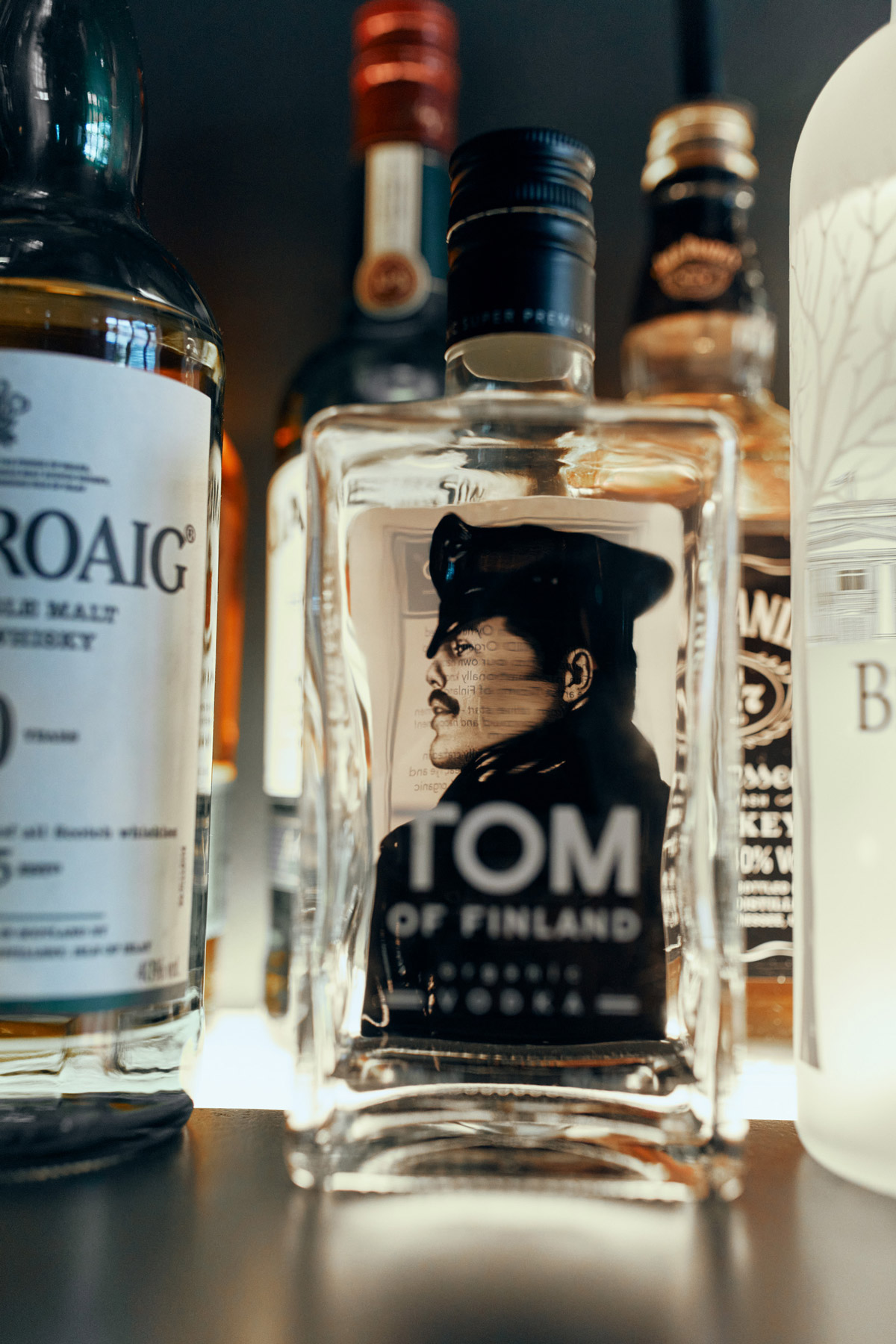
»I wouldn’t do comedy if I didn’t enjoy the attention.«
MYP Magazine:
Your videos are very successful and reach a larger and larger audience, and with it the number of your fans grows steadily. How do people react to you when they meet you in private? Do they expect you to be the funny gay comedian there as well?
Daniel:
I don’t know. I think it’s more challenging for me when the people I meet are expecting that I know them. Or when they are thinking that they have some sort of ownership over my time although they’re just a stranger. Don’t get me wrong: It’s really nice to have so many fans and I appreciate that. But when I’m in a private situation, having a coffee with a friend, for example, and some stranger suddenly interjects through my day, wanting a full conversation with me immediately, or maybe screaming like “Oh my God, it’s you!” when I’m just living my day, that’s something I still haven’t gotten used to. I just don’t see myself as a celebrity.
MYP Magazine:
But are you still able to enjoy that kind of fame from time to time?
Daniel:
Absolutely! I wouldn’t do comedy if I didn’t enjoy the attention. But for me, this is more about making people laugh and expressing my thoughts. It’s not so much about gaining recognition and popularity.
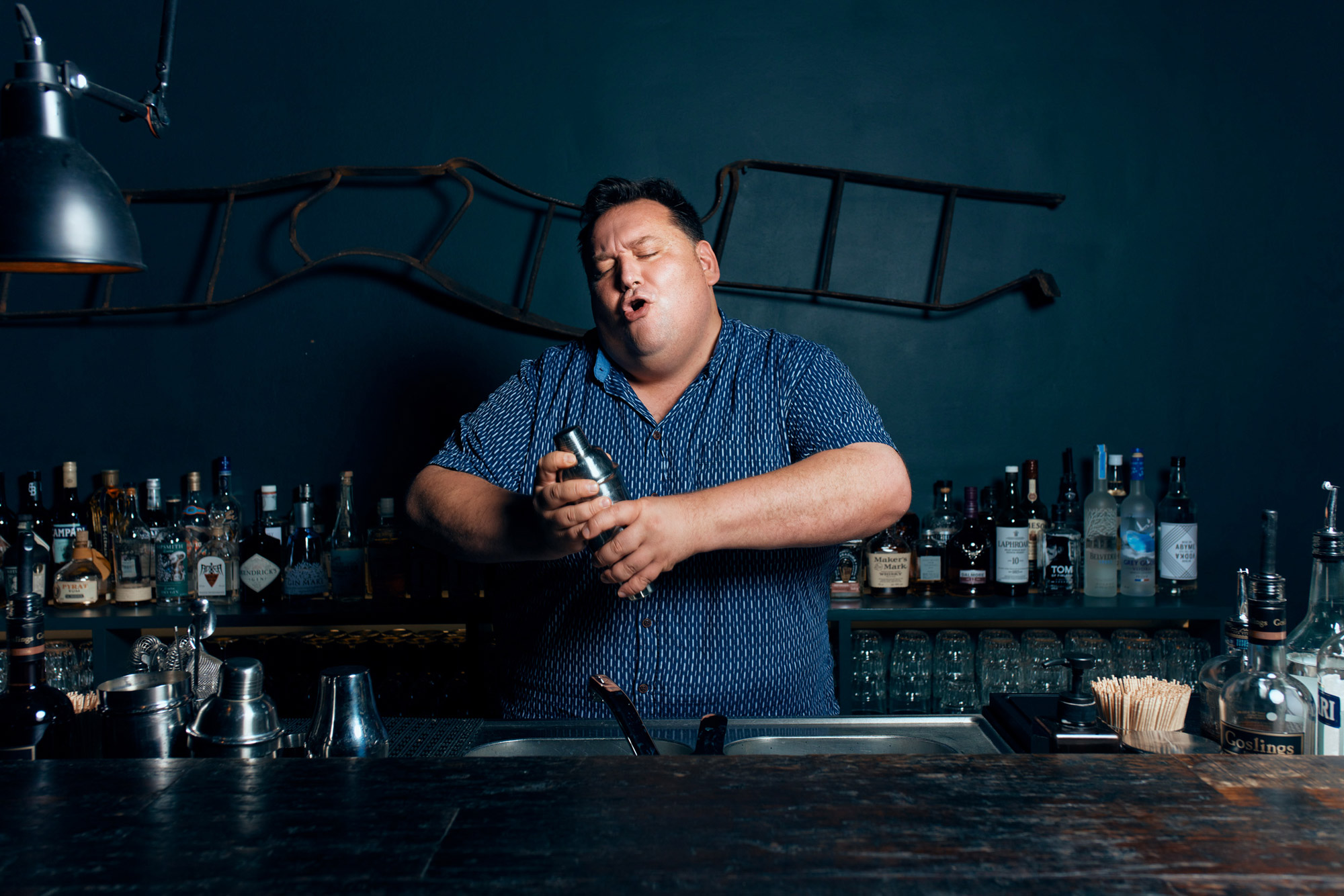
»I wanted to have something where my fans can connect with me directly.«
MYP Magazine:
Last year you created a Patreon account which means that there’s an additional platform now where you publish your content. What was the reason for that decision? Weren’t you happy with the growing success of your other social media channels?
Daniel:
Patreon is still very new to Europe, so I thought it could be a nice investment to be one of the first few people trying to do it in Berlin. But the main reason was that the amount of people who put comments on my posts on YouTube and Instagram is so high now that I just can’t read all of them. I would love to, but it’s just too much and absolutely overwhelming. That’s why I wanted to have something where my fans can connect with me directly and I would definitely reply to them after I read what they have to say. I wanted to build a little community because, especially during the lockdown, I wasn’t able to perform live obviously and I wanted to find a way to make money for my content. I was doing PayPal donations for a while, but I thought Patreon would be better because it keeps your fans engaged and going on a journey with you.
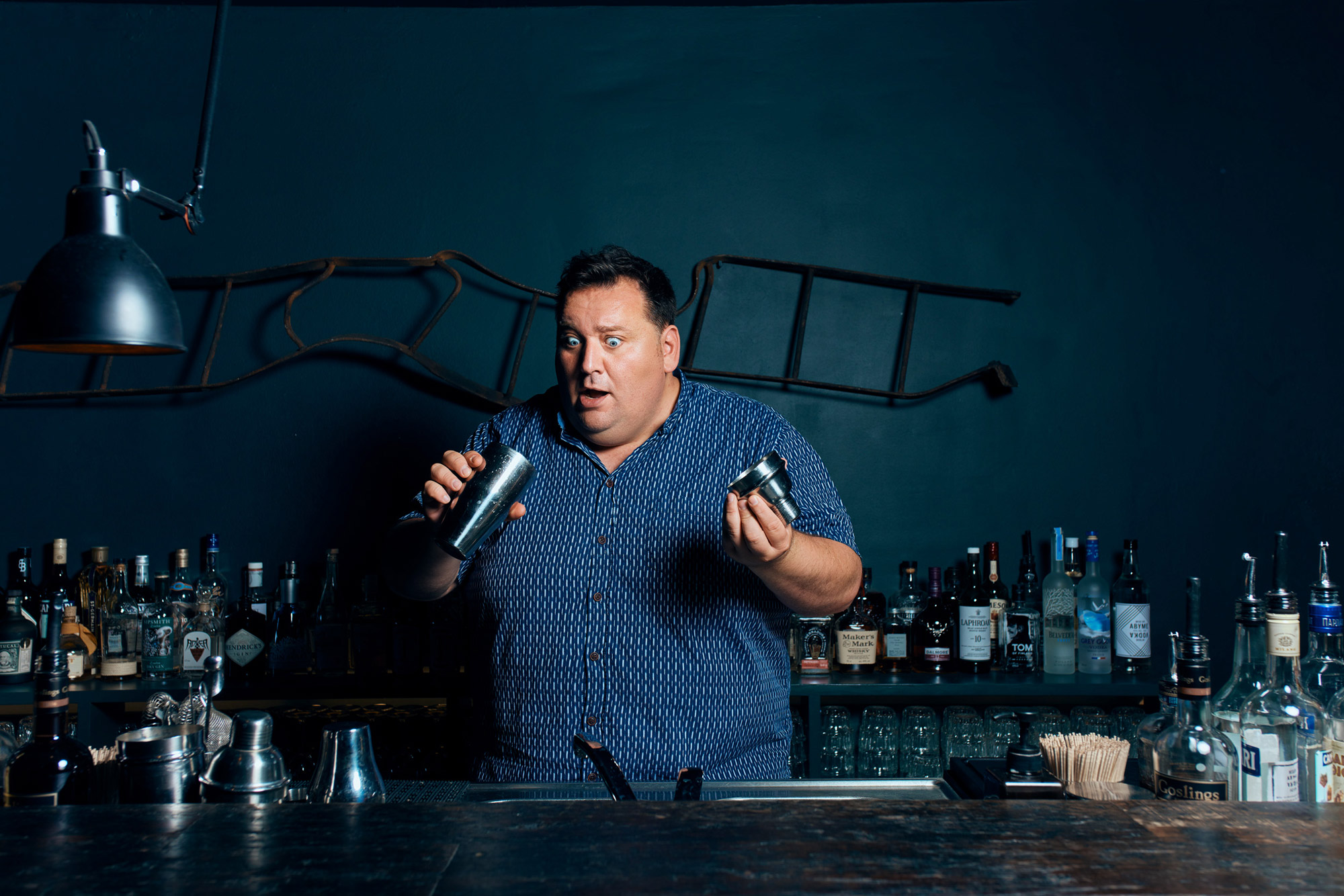
»If you want to have unrealistic expectations for yourself, that’s fine. But when you put that out on other people, that’s a problem.«
MYP Magazine:
In my opinion, one of the secrets of your success is that you’re addressing topics that a lot of people can fully relate to, for example when you’re making fun of the extreme body fetish that we’re all exposed to, especially in the gay scene. Do you think that the community has to heal and change itself first before it can heal and change others?
Daniel:
Hmm, I think that things already get better with that though, at least in some ways. Even if it’s just the surface, even if people are just pretending to be body positive (laughs out loud). The main thing is not to shame or judge other people. I mean, if you want to have unrealistic expectations for yourself, that’s fine. But when you put that out on other people, that’s a problem.
On the other hand, things are getting worse in some ways. I’m just thinking of Instagram. The number of photos that people take of themselves when they have abs and want to gain attention with that is very weird to me. I’ve never been someone who got attention or validation for the way I look. It was always because of my sense of humor, my mind, or my creativity. So, if that’s how they’re getting love, it’s ok. At least they’re feeling good about themselves.
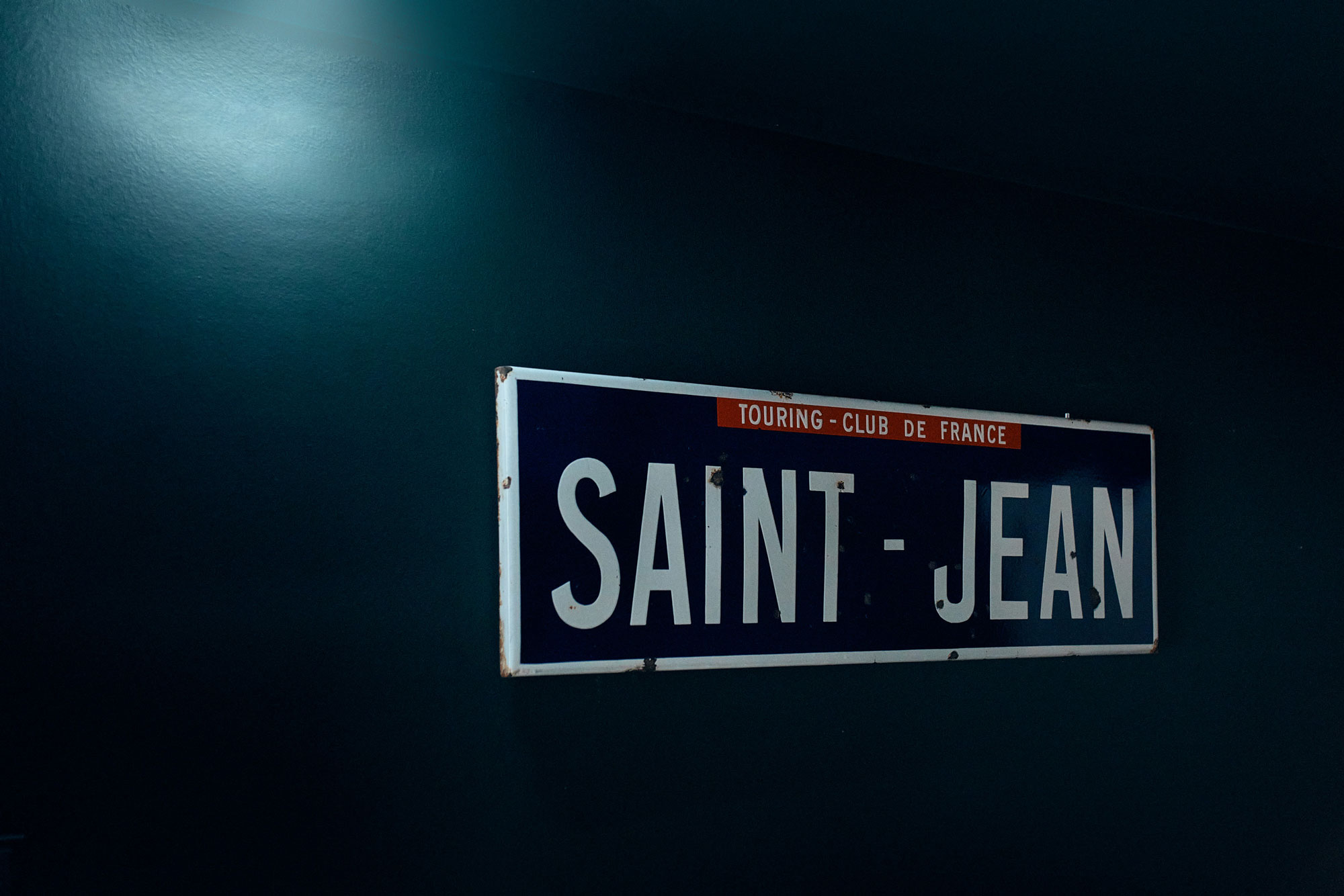
»We all demand more body positivity, and for me that means respecting other people.«
MYP Magazine:
As a part of the community, you know that there are still people that evaluate a person based on their visual appearance, sexual performance, or penis size…
Daniel:
Yes, but I think they only do that when it comes to their own sex life and their personal preferences. You would be a real asshole if you didn’t want to be friends with someone because of something like that. I definitely don’t know anyone like that.
We all demand more body positivity, and for me that means respecting other people. But at the same time, you can’t force people to be attracted to someone who they aren’t attracted to. Maybe that will change with more people showing their bodies and being less ashamed of the way they look.
MYP Magazine:
Would you consider yourself a role model?
Daniel:
Sure! Why not? (laughs out loud)
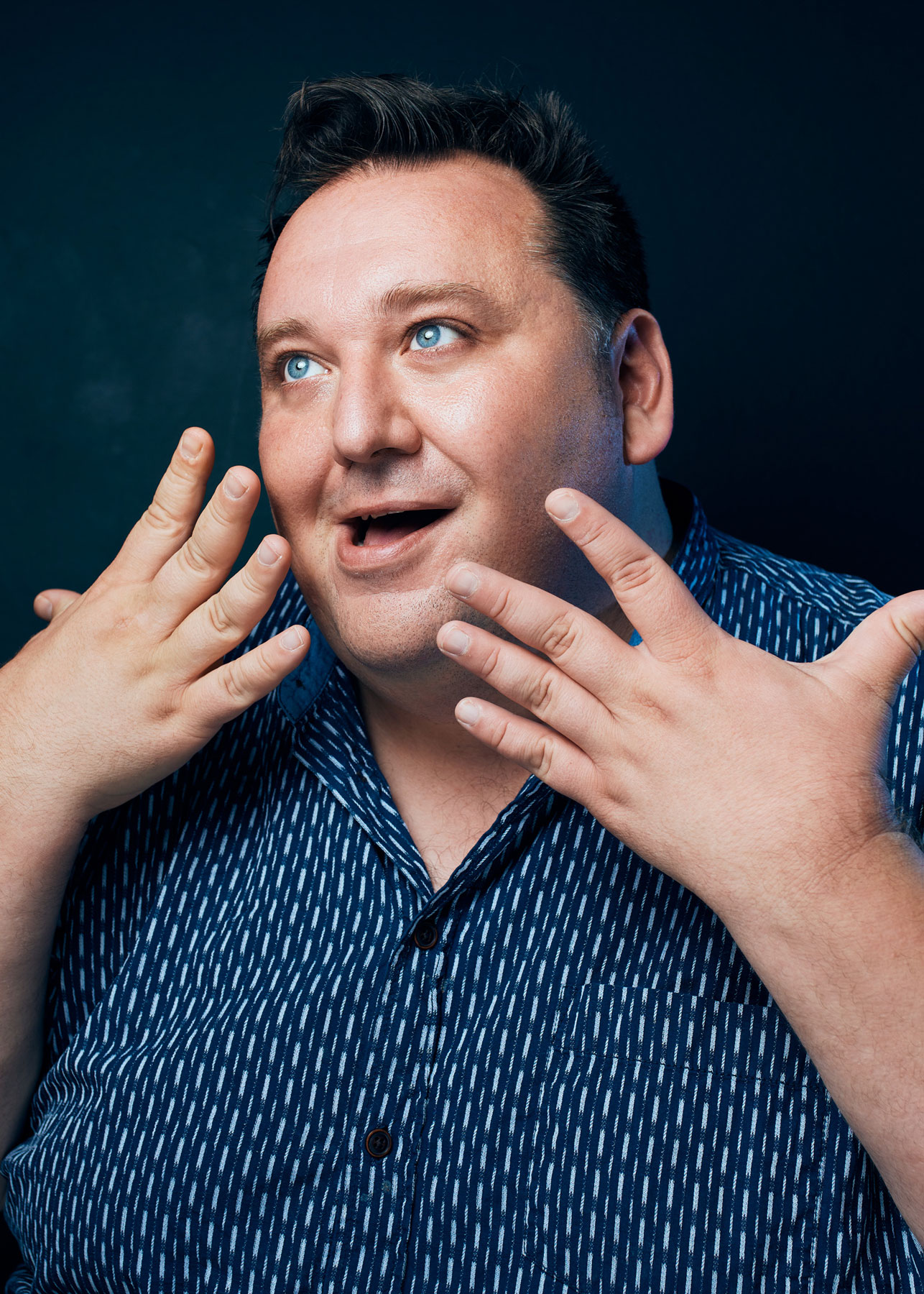
»I don’t think that comedy is a safe space.«
MYP Magazine:
We are in one place here that is very special. Since the very first day of its opening, the Bar Saint Jean has always been a safe space for people in Berlin, especially when they’re part of the queer community. Here you could always be who, what and how you wanted to be. Would you say that you—with all your content—have also created some kind of safe space for the community, just a virtual one?
Daniel:
No, I don’t think that comedy is a safe space. It’s a dangerous zone! (smiles) I can’t control how other people perceive me and what they might get offended by. But I definitely have good intentions. Even if I’m snarky or bitchy, that’s just a style of my comedy. I think that people don’t need to be constantly offended by everything. I definitely felt that towards the end of the second lockdown, people were very negative and nitpicky then. But apart from that, I don’t really believe in safe spaces, it’s a lame concept. Life is hard. You’re going to encounter difficult people in the world, deal with it! (laughs) Sorry, I think that was a little harsh, wasn’t it?
#danielryanspaulding #itsberlin #barsaintjean #mypmagazine
Many thanks to Johann and his Bar Saint Jean:
barsaintjean.com
instagram.com/barsaintjean
Opening Hours:
Mon: Closed
Tue: 7:00 pm – 2:00 am
Wed: 7:00 pm – 2:00 am
Thu: 7:00 pm – 2:00 am
Fri: 7:00 pm – 3:00 am
Sat: 7:00 pm – 3:00 am
Sun: 7:00 pm – 2:00 am
More about Daniel-Ryan Spaulding:
danielryanspaulding.com
instagram.com/danielryanspaulding
patreon.com/danielryanspaulding
Photography: Maximilian König
Interview & text: Jonas Meyer
Editing: Benjamin Overton
